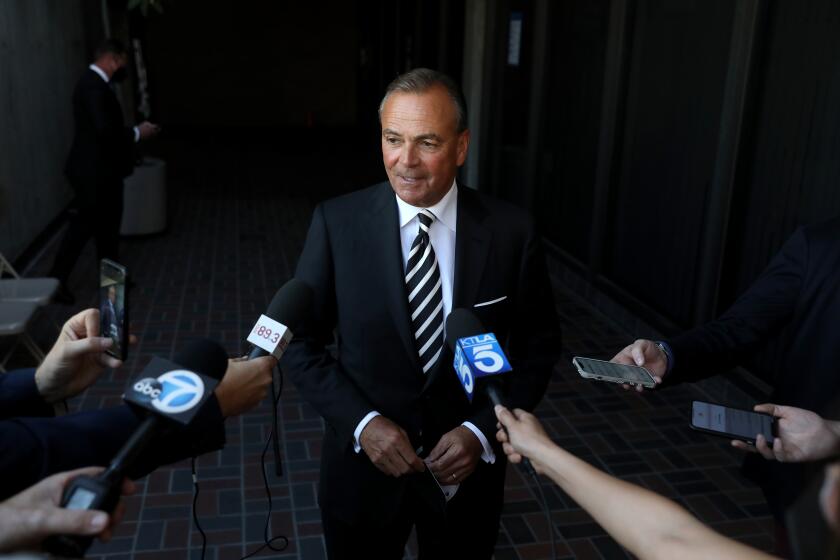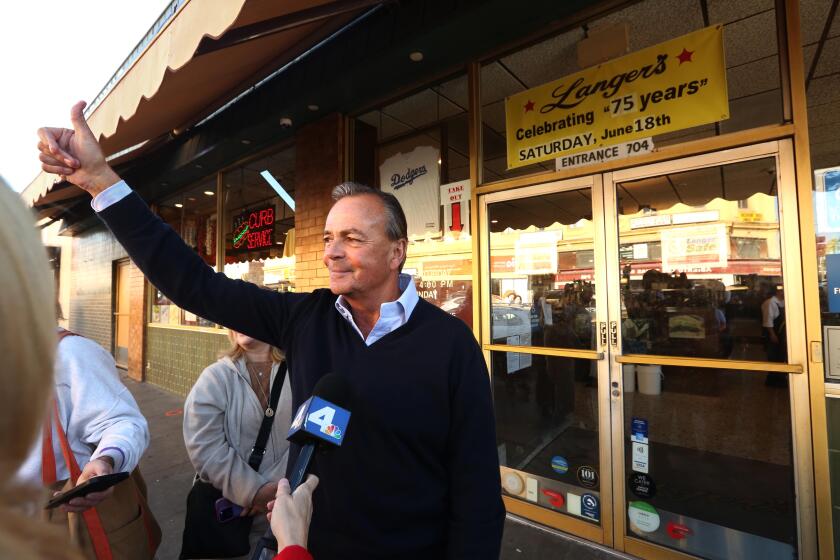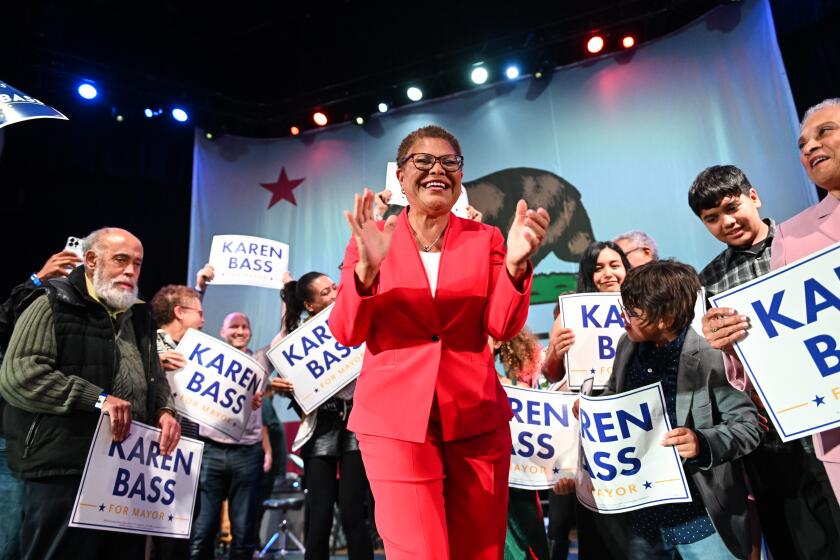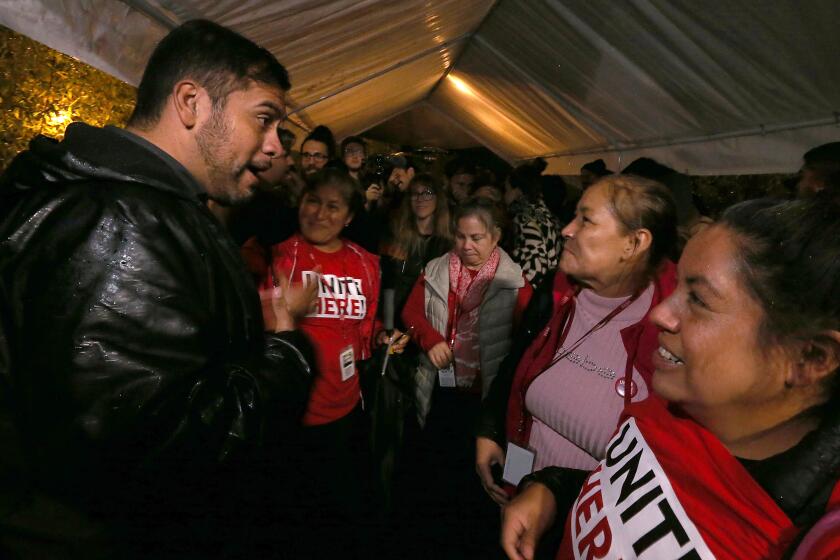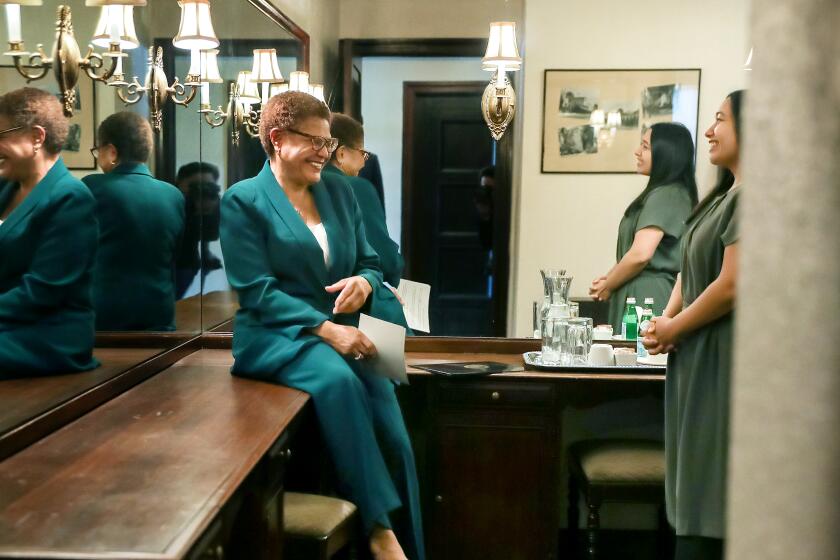In secret testimony, Caruso was grilled about what USC knew about disgraced gynecologist
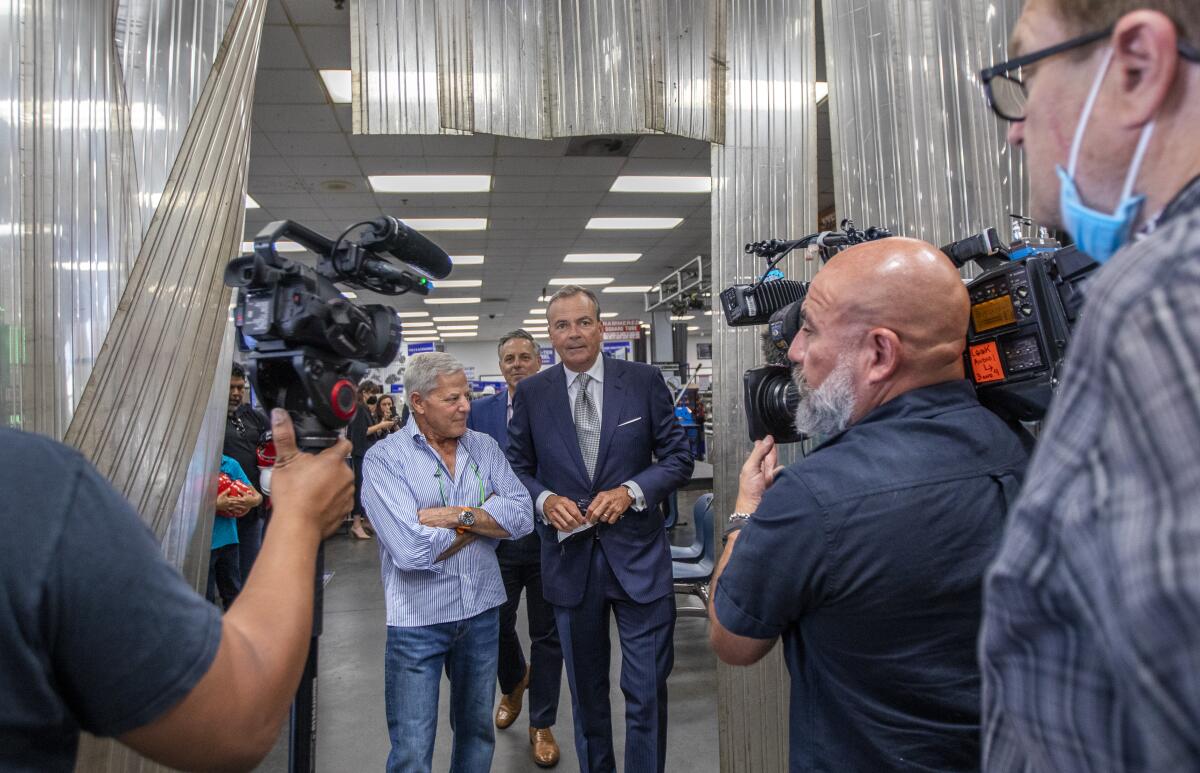
- Share via
In his Brentwood mansion two years ago, Rick Caruso sat down in front of his iPad, raised his right hand and swore to tell the truth. Over the next nine hours, lawyers for hundreds of USC students and alumnae grilled the developer, then chair of the university’s governing board, about who was to blame for sexual abuse and harassment they said they suffered at the hands of a campus gynecologist.
The answers Caruso gave in late October 2020 at a remotely held deposition were sealed from public view by a protective order in the case and have remained secret since, even as the billionaire embarked on a mayoral campaign premised in part on his performance at USC.
A transcript of the deposition recently reviewed by The Times showed Caruso refusing to answer many questions, on the advice of USC’s legal team. With more than half a dozen university lawyers monitoring his testimony, he invoked attorney-client privilege again and again in declining to reveal discussions with administrators about Dr. George Tyndall or the conclusions of an investigation into the gynecologist’s troubled history at a campus clinic.
“Based on the advice of counsel, as we’ve talked about, I can’t release the information. I’m sorry,” Caruso replied after being asked whether women suing would ever know “who was responsible for their being sexually assaulted in the stirrups by their doctor.”
Five months after his testimony, Caruso and other trustees signed off on a landmark $852-million settlement that brought the total compensation for Tyndall’s former patients to more than $1.1 billion — the largest sex-abuse payout in education history.
Get the lowdown on L.A. politics
Sign up for our L.A. City Hall newsletter to get weekly insights, scoops and analysis.
You may occasionally receive promotional content from the Los Angeles Times.
Caruso, who took over as chair of USC’s board shortly after revelations about Tyndall became public, has long positioned his steering of the university out of crisis as an example of the leadership he would offer in City Hall. The election is three weeks away, and early voting has begun.
His opponent, U.S. Rep. Karen Bass (D-Los Angeles), has argued that he bears some responsibility for Tyndall because he served on the board during the gynecologist’s final decade treating patients. In one ad, Bass’ campaign accused Caruso of failing women during the “ugliest chapter in the school’s history.”
In his testimony, Caruso said he had never heard Tyndall’s name until March 2018, when The Times began asking former and current employees about the gynecologist. The Times’ investigation prompted the university’s president and general counsel to brief the board’s executive committee in a phone call. Administrators had quietly forced Tyndall out the previous year after decades of complaints, but they failed to alert trustees or students.
“Were you upset as a board member you didn’t know about Tyndall earlier?” asked John Manly, the lead attorney for the patients, during the deposition.
“Yes. ... It was wrong,” Caruso said. “The board should have been immediately notified.”
What then-president C.L. Max Nikias told Caruso and other trustees about Tyndall in the initial phone call and in numerous meetings that followed was an area of pressing interest to the lawyers questioning Caruso. But he testified that he could not disclose any part of those conversations without violating the attorney-client privilege between the school and lawyers who participated in the discussions.
The university asked the developer and trustee to guide it through its lowest point in history. Now running for mayor, Rick Caruso is inviting voters to look at how he “cleaned up the messes at USC” and will do the same for the city of L.A.
Some of the most contentious lines of questioning centered on an investigation into Tyndall by the law firm O’Melveny & Myers. Caruso told reporters in 2018 and 2019 that he planned to make the firm’s findings public. To this day, the conclusions remain confidential.
Caruso’s failure to deliver on that promise has been a point of attack for Bass, who this month asked in a radio debate, “What about the victims? If that’s what they wanted, they should have had it.”
Caruso countered that the decision was based on concern about victims. Experts, he has said, told the trustees the details could retraumatize Tyndall’s patients.
In his testimony, Caruso offered a different explanation. He said that after O’Melveny’s lawyers laid out their conclusions in private presentations to him and other trustees, USC’s legal team advised the board not to release the information.
Asked Tuesday in an interview about the discrepancy, Caruso denied that his reasons were inconsistent.
“You got to take the evolution of the time,” he said. “Once we got to a settlement that everybody had agreed to, I don’t want to cause any more harm to anybody. Why would I?”
He reiterated that he considered Tyndall’s conduct abhorrent and asserted that the board was bound by the obligations of attorney-client privilege.
“The trustees are not going to go overrule the general counsel in the middle of a lawsuit, right? It’s never going to happen, nor frankly should it happen, from a business best-operating practices” standpoint, he said.
Manly, the attorney who did much of the questioning of Caruso, refused to discuss the deposition and did not provide it to The Times.
“Mr. Caruso didn’t create George Tyndall. Maybe he had nothing to do with it,” Manly said Tuesday. “But the fact that he’s running for mayor and hasn’t called for the report’s release is troubling, given the number of victims.”
Both USC and Caruso pointed to the archive of records about Tyndall posted on the university’s website, which has more than 600 pages of complaints, internal memos and a once-confidential report on Tyndall’s medical practices. A judge ordered USC to release “all available nonprivileged information” about Tyndall’s time at the university after The Times petitioned for access to the records.
During the questioning in 2020, Manly suggested at one point that Caruso’s pledge of transparency was nothing more than a “public relations stunt,” according to the transcript.
“Is it true that … there was never an intent to make the report public?” asked Manly.
“No,” Caruso replied, adding, “I take great pride in my word.”
“But you broke your word here,” Manly said.
“No, I didn’t,” Caruso insisted.
Dr. George Tyndall arrived on the USC campus in the summer of 1989.
He said he had contemplated releasing information over the objections of the lawyers.
“Many times I would have liked to have done that, but I have a broader duty, and it is beyond satisfying myself,” Caruso said.
“I was a bit naive and maybe a bit too eager as the new board chair,” he said at another point. “Unfortunately, I couldn’t fulfill ... my promise of full transparency the way I had hoped and intended to.”
At times in the deposition, Caruso seemed to be walking a tightrope between his public image of empathetic reformer and his fiduciary duties as leader of a multibillion-dollar institution embroiled in high-stakes litigation.
Though he had issued a public apology to Tyndall’s patients and helped oust Nikias as president, Caruso brushed off a question about whether the university was at fault.
“I really can’t answer that,” he replied. “It’s going to be heavily litigated by you and others in front of a jury, in front of a judge, and I will not presuppose any of that.”
He similarly declined to lay blame on specific supervisors or administrators.
“Counselor, I have a strong criticism of the system that allowed this to happen. ... I’ve apologized for it. I said it’s unacceptable,” Caruso said. “But I am not going to name any one person in this deposition.”
Caruso said he didn’t receive information about Tyndall outside of meetings where USC lawyers were present. Attorneys for the women queried him about whether he had discussed the issue with an intriguing list of individuals: Lakers president Jeanie Buss, former Los Angeles Police Department Chief Charlie Beck, noted litigator Daniel Petrocelli or anyone in the Trump White House. Caruso denied each of them.
As the deposition slogged into the late afternoon, the lawyers kept asking Caruso to divulge information, and he continued invoking attorney-client privilege, prompting USC’s attorneys to complain at length that their counterparts were “badgering” and “harassing” the witness.
Caruso, who holds a law degree and said he had sat for a dozen depositions in various matters, seemed unflappable. Asked whether he had passed the bar exam, Caruso quipped, “Amazingly so.”
Questioned about donations to the candidates for L.A. County district attorney at the time — Jackie Lacey and George Gascón — Caruso acknowledged sending money to both campaigns.
“I’m being a pure pragmatist,” he said.
In the final stretch of testimony, as the attorneys appeared increasingly frustrated, one accused Caruso of looking down at his phone to send text messages rather than paying attention to questions.
He denied it, explaining, “My dog is down here. Do you want to see a picture of my dog? I’m leaning down, and I’m looking down at him.” Caruso added, “He’s my buddy.”
More to Read
Sign up for Essential California
The most important California stories and recommendations in your inbox every morning.
You may occasionally receive promotional content from the Los Angeles Times.
